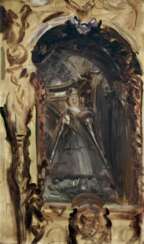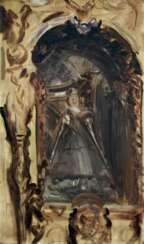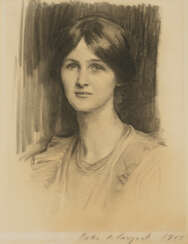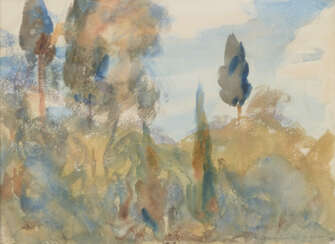сарджент
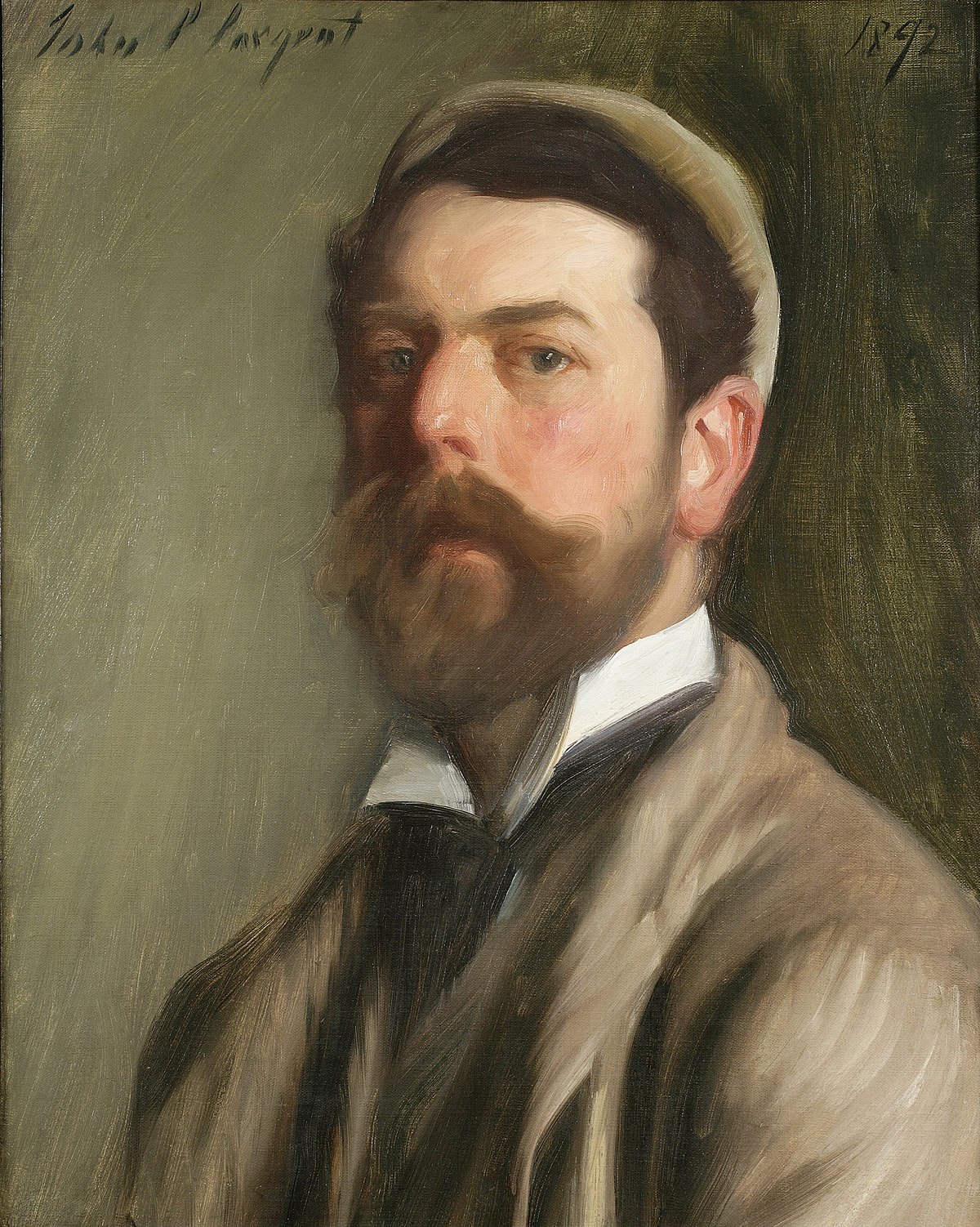
John Singer Sargent was an American artist celebrated for his captivating portraits, which mirrored the luxury of the Edwardian era. Born to American parents in Florence, Italy, Sargent was a well-traveled individual, fluent in multiple languages, and exposed to European art from a young age. His early artistic training came under the tutelage of Carolus-Duran in Paris, which significantly influenced his style and approach to art. Sargent's work, characterized by its striking realism and attention to detail, gained international acclaim, especially among the aristocracy in England and the United States.
Noteworthy is John Singer Sargent's "Carnation, Lily, Lily, Rose," a piece that, after its display at the Royal Academy in 1887, solidified his status in the London art scene. This painting, along with many others, showcases his ability to capture the essence of his subjects, earning him numerous commissions from prominent figures of his time. However, by the early 20th century, Sargent shifted his focus to watercolors and murals, seeking respite from the demands of portrait commissions. His mural works, like those for the Boston Public Library, highlight his versatility and commitment to art beyond portraiture.
For collectors and art experts, understanding John Singer Sargent's journey—from his early days in Florence and Paris to his ultimate success as a portraitist and muralist—offers valuable insights into his artistic evolution and the historical context of his work. His pieces, housed in prestigious institutions worldwide, continue to captivate audiences with their elegance and technical prowess.
If you're keen on staying updated with events and sales related to John Singer Sargent's art, consider signing up for updates. This subscription will keep you informed about new product sales and auction events specifically related to Sargent's works, ensuring you don't miss out on valuable opportunities.


John Singer Sargent was an American artist celebrated for his captivating portraits, which mirrored the luxury of the Edwardian era. Born to American parents in Florence, Italy, Sargent was a well-traveled individual, fluent in multiple languages, and exposed to European art from a young age. His early artistic training came under the tutelage of Carolus-Duran in Paris, which significantly influenced his style and approach to art. Sargent's work, characterized by its striking realism and attention to detail, gained international acclaim, especially among the aristocracy in England and the United States.
Noteworthy is John Singer Sargent's "Carnation, Lily, Lily, Rose," a piece that, after its display at the Royal Academy in 1887, solidified his status in the London art scene. This painting, along with many others, showcases his ability to capture the essence of his subjects, earning him numerous commissions from prominent figures of his time. However, by the early 20th century, Sargent shifted his focus to watercolors and murals, seeking respite from the demands of portrait commissions. His mural works, like those for the Boston Public Library, highlight his versatility and commitment to art beyond portraiture.
For collectors and art experts, understanding John Singer Sargent's journey—from his early days in Florence and Paris to his ultimate success as a portraitist and muralist—offers valuable insights into his artistic evolution and the historical context of his work. His pieces, housed in prestigious institutions worldwide, continue to captivate audiences with their elegance and technical prowess.
If you're keen on staying updated with events and sales related to John Singer Sargent's art, consider signing up for updates. This subscription will keep you informed about new product sales and auction events specifically related to Sargent's works, ensuring you don't miss out on valuable opportunities.
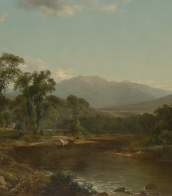

John Singer Sargent was an American artist celebrated for his captivating portraits, which mirrored the luxury of the Edwardian era. Born to American parents in Florence, Italy, Sargent was a well-traveled individual, fluent in multiple languages, and exposed to European art from a young age. His early artistic training came under the tutelage of Carolus-Duran in Paris, which significantly influenced his style and approach to art. Sargent's work, characterized by its striking realism and attention to detail, gained international acclaim, especially among the aristocracy in England and the United States.
Noteworthy is John Singer Sargent's "Carnation, Lily, Lily, Rose," a piece that, after its display at the Royal Academy in 1887, solidified his status in the London art scene. This painting, along with many others, showcases his ability to capture the essence of his subjects, earning him numerous commissions from prominent figures of his time. However, by the early 20th century, Sargent shifted his focus to watercolors and murals, seeking respite from the demands of portrait commissions. His mural works, like those for the Boston Public Library, highlight his versatility and commitment to art beyond portraiture.
For collectors and art experts, understanding John Singer Sargent's journey—from his early days in Florence and Paris to his ultimate success as a portraitist and muralist—offers valuable insights into his artistic evolution and the historical context of his work. His pieces, housed in prestigious institutions worldwide, continue to captivate audiences with their elegance and technical prowess.
If you're keen on staying updated with events and sales related to John Singer Sargent's art, consider signing up for updates. This subscription will keep you informed about new product sales and auction events specifically related to Sargent's works, ensuring you don't miss out on valuable opportunities.
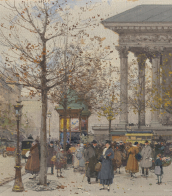

John Singer Sargent was an American artist celebrated for his captivating portraits, which mirrored the luxury of the Edwardian era. Born to American parents in Florence, Italy, Sargent was a well-traveled individual, fluent in multiple languages, and exposed to European art from a young age. His early artistic training came under the tutelage of Carolus-Duran in Paris, which significantly influenced his style and approach to art. Sargent's work, characterized by its striking realism and attention to detail, gained international acclaim, especially among the aristocracy in England and the United States.
Noteworthy is John Singer Sargent's "Carnation, Lily, Lily, Rose," a piece that, after its display at the Royal Academy in 1887, solidified his status in the London art scene. This painting, along with many others, showcases his ability to capture the essence of his subjects, earning him numerous commissions from prominent figures of his time. However, by the early 20th century, Sargent shifted his focus to watercolors and murals, seeking respite from the demands of portrait commissions. His mural works, like those for the Boston Public Library, highlight his versatility and commitment to art beyond portraiture.
For collectors and art experts, understanding John Singer Sargent's journey—from his early days in Florence and Paris to his ultimate success as a portraitist and muralist—offers valuable insights into his artistic evolution and the historical context of his work. His pieces, housed in prestigious institutions worldwide, continue to captivate audiences with their elegance and technical prowess.
If you're keen on staying updated with events and sales related to John Singer Sargent's art, consider signing up for updates. This subscription will keep you informed about new product sales and auction events specifically related to Sargent's works, ensuring you don't miss out on valuable opportunities.
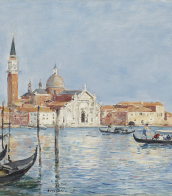

John Singer Sargent was an American artist celebrated for his captivating portraits, which mirrored the luxury of the Edwardian era. Born to American parents in Florence, Italy, Sargent was a well-traveled individual, fluent in multiple languages, and exposed to European art from a young age. His early artistic training came under the tutelage of Carolus-Duran in Paris, which significantly influenced his style and approach to art. Sargent's work, characterized by its striking realism and attention to detail, gained international acclaim, especially among the aristocracy in England and the United States.
Noteworthy is John Singer Sargent's "Carnation, Lily, Lily, Rose," a piece that, after its display at the Royal Academy in 1887, solidified his status in the London art scene. This painting, along with many others, showcases his ability to capture the essence of his subjects, earning him numerous commissions from prominent figures of his time. However, by the early 20th century, Sargent shifted his focus to watercolors and murals, seeking respite from the demands of portrait commissions. His mural works, like those for the Boston Public Library, highlight his versatility and commitment to art beyond portraiture.
For collectors and art experts, understanding John Singer Sargent's journey—from his early days in Florence and Paris to his ultimate success as a portraitist and muralist—offers valuable insights into his artistic evolution and the historical context of his work. His pieces, housed in prestigious institutions worldwide, continue to captivate audiences with their elegance and technical prowess.
If you're keen on staying updated with events and sales related to John Singer Sargent's art, consider signing up for updates. This subscription will keep you informed about new product sales and auction events specifically related to Sargent's works, ensuring you don't miss out on valuable opportunities.
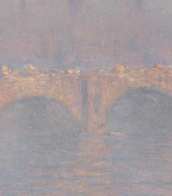

John Singer Sargent was an American artist celebrated for his captivating portraits, which mirrored the luxury of the Edwardian era. Born to American parents in Florence, Italy, Sargent was a well-traveled individual, fluent in multiple languages, and exposed to European art from a young age. His early artistic training came under the tutelage of Carolus-Duran in Paris, which significantly influenced his style and approach to art. Sargent's work, characterized by its striking realism and attention to detail, gained international acclaim, especially among the aristocracy in England and the United States.
Noteworthy is John Singer Sargent's "Carnation, Lily, Lily, Rose," a piece that, after its display at the Royal Academy in 1887, solidified his status in the London art scene. This painting, along with many others, showcases his ability to capture the essence of his subjects, earning him numerous commissions from prominent figures of his time. However, by the early 20th century, Sargent shifted his focus to watercolors and murals, seeking respite from the demands of portrait commissions. His mural works, like those for the Boston Public Library, highlight his versatility and commitment to art beyond portraiture.
For collectors and art experts, understanding John Singer Sargent's journey—from his early days in Florence and Paris to his ultimate success as a portraitist and muralist—offers valuable insights into his artistic evolution and the historical context of his work. His pieces, housed in prestigious institutions worldwide, continue to captivate audiences with their elegance and technical prowess.
If you're keen on staying updated with events and sales related to John Singer Sargent's art, consider signing up for updates. This subscription will keep you informed about new product sales and auction events specifically related to Sargent's works, ensuring you don't miss out on valuable opportunities.
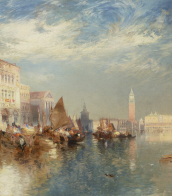

John Singer Sargent was an American artist celebrated for his captivating portraits, which mirrored the luxury of the Edwardian era. Born to American parents in Florence, Italy, Sargent was a well-traveled individual, fluent in multiple languages, and exposed to European art from a young age. His early artistic training came under the tutelage of Carolus-Duran in Paris, which significantly influenced his style and approach to art. Sargent's work, characterized by its striking realism and attention to detail, gained international acclaim, especially among the aristocracy in England and the United States.
Noteworthy is John Singer Sargent's "Carnation, Lily, Lily, Rose," a piece that, after its display at the Royal Academy in 1887, solidified his status in the London art scene. This painting, along with many others, showcases his ability to capture the essence of his subjects, earning him numerous commissions from prominent figures of his time. However, by the early 20th century, Sargent shifted his focus to watercolors and murals, seeking respite from the demands of portrait commissions. His mural works, like those for the Boston Public Library, highlight his versatility and commitment to art beyond portraiture.
For collectors and art experts, understanding John Singer Sargent's journey—from his early days in Florence and Paris to his ultimate success as a portraitist and muralist—offers valuable insights into his artistic evolution and the historical context of his work. His pieces, housed in prestigious institutions worldwide, continue to captivate audiences with their elegance and technical prowess.
If you're keen on staying updated with events and sales related to John Singer Sargent's art, consider signing up for updates. This subscription will keep you informed about new product sales and auction events specifically related to Sargent's works, ensuring you don't miss out on valuable opportunities.

